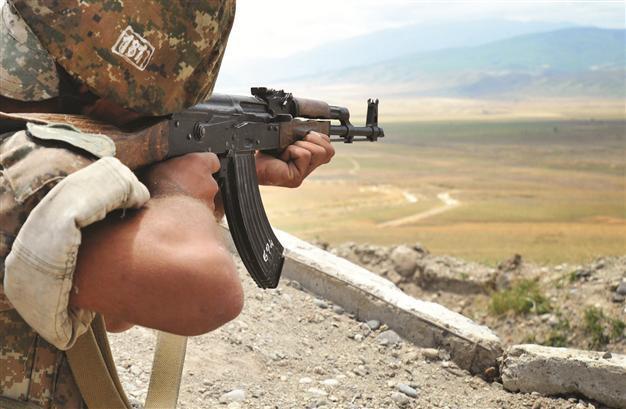NATO dives into tense Caucasus
YEREVAN

An Armenian soldier of the self-proclaimed republic of Nagorno-Karabagh aims his Kalashnikov assault rifle as he stands in a trench at the frontline on the border with Azerbaijan, near the town of Martakert. Armenia and Azerbaijan are locked in a long-running conflict over the disputed region, where they fought a war in the 1990s. AFP photo
NATO Secretary-General Anders Fogh Rasmussen has started a Caucasus regional tour in Yerevan, where he is expected to discuss regional issues with President Serzh Sargsyan, Foreign Minister Edward Nalbandian and Defense Minister Seyran Ohanyan. Rasmussen will then head to Azerbaijan and Georgia, according to the NATO press service.
His visit comes at a critical time when Armenia and neighboring Azerbaijan are at odds over Azerbaijani President Ilham Aliyev’s decision to pardon an Azerbaijani military officer who had been jailed for life in Hungary for the murder of an Armenian officer in 2004.
Last week Hungary released Ramil Safarov, who had served eight years of his life sentence for killing an Armenian officer during NATO training in Hungary. Though the international community showed its concerns over Safarov’s extradition, NATO has remained silent. Most notably, the U.S., the EU and Russia expressed their concerns. Rasmussen will also deliver a keynote speech at the University of Yerevan.
Parliament convenes
Armenian Parliament is also discussing a bill to recognize Nagorno-Karabakh as an independent country, though no date has yet been scheduled for the vote. Political analysts in Armenia say that the Safarov situation has created a good occasion for the recognition of Nagorno-Karabakh’s independence, according Armenianow website. Armenia and Azerbaijan are locked in a long-running conflict over the disputed region, where they fought a war in the 1990s.
The bill has been proposed several times in the past several years, but it was left out by the parliamentary majority every time with the explanation that the time was not yet ripe. “We all should understand: The fact that during so many years Armenia has not recognized the Nagorno-Karabakh Republic is due to the fact that Armenia is trying to reach a result through negotiations. At the same time, we must understand that any adventure by Azerbaijan, any actions taken outside the OSCE Minsk Group framework will speed up the recognition of the NKR on our part,” the Armenian president said last year. The National Assembly also called an emergency session yesterday and was expected to adopt a statement condemning the extradition and pardon of Safarov.
Threat from ASALAMeanwhile, the Armenian Secret Army for the Liberation of Armenia (ASALA) has threatened diplomatic missions and citizens of Azerbaijan in foreign countries in retaliation for the pardoning. “Azerbaijani diplomats and students studying abroad, businessmen, activists of Azeri Diaspora organizations and officials will be killed,” read a letter sent to Azerbaijan’s embassy in Hungary.
